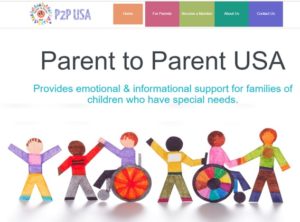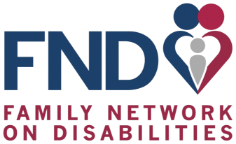INformation Hub
Parent-to-Parent Support
Parent-to-Parent Support
Updated, October 2018
Originally written by Betsy Santelli
En español
_________________

Sandra and Bruce’s Story
Sandra and Bruce had been married five years when their son Peter was born. He was a simply beautiful baby and changed their lives forever.
It took awhile for Sandra and Bruce to realize that Peter wasn’t developing at the same rate as other children. He talked and played, but he didn’t walk until he was almost two years old. He fell a lot, even when he was four and then five. When Peter was six, Sandra and Bruce took him to a specialist to see what was causing the problem. They learned that Peter has muscular dystrophy.
The news came as a tremendous shock. They started reading everything they could get their hands on about muscular dystrophy. The information helped them address Peter’s needs, but they felt terribly alone and unsure of themselves. They didn’t know if they were really doing the right things for Peter. There wasn’t enough time in any one doctor’s appointment to get all their questions answered—or even asked!
A nurse told them about a program called Parent to Parent. She said that Parent to Parent could put them in touch with other parents like themselves, people who had a child with muscular dystrophy. Sandra and Bruce contacted Parent to Parent that week. Two days later they were put in touch with a nearby mom and dad. This couple, Joan and Richard, had a teenager named Sam with muscular dystrophy. And the conversations—and an unexpected friendship— began!
 What’s Parent to Parent?
What’s Parent to Parent?
Parent to Parent is a program that provides information and one-to-one emotional support to parents of children who have special needs. The program operates very simply. Trained and experienced parents are carefully matched in one-to-one relationships with parents who are new to the program. The matches are based upon similarities in disability and family issues.
That’s what happened in Sandra and Bruce’s case. They were put in touch with Joan and Richard, who had an older child with the same disability. Joan and Richard have “been there,” as the saying goes. And because of their experience, they have a lot of wisdom and caring to share.
Parent to Parent matches are usually made very quickly, often within 24 hours of the referral. At the time of the match, parents contacting the program may have just learned that their child has a disability. Or the parents may be dealing with a new stage in their child’s life.
What Happens After Parents Are Matched Up?
Once parent matches are made, each relationship develops on its own. A lot depends on what the parents seeking support need and want. Some parents are just looking for information—information about resources in the community, for example, or more in-depth information about the disability. These matches are usually short term. The parents get the information they need and use it to improve their daily life or address whatever concerns they have.
For other parents, the match lasts for years and develops into a lifelong friendship. The experienced parents can share a lot of “tips” that make daily living easier. Other things get shared, too, like laughter and worries, stories about the children and the rest of the family, resources that might be helpful, strategies for dealing with issues the families have in common, how to deal with school systems and doctors, and the incredible joy and stress of parenting.
Since the parents share so many common experiences, the Parent to Parent match offers a unique form of support. This support is different from the support that professionals provide. And, because the relationship between the parents is one to one, the support is different from that found in larger parent groups.
Can Parent to Parent Really Help Me?
Yes, it most likely can! While professionals can be very helpful to you and your child, you may feel like many parents do—wishing you could talk to another parent who has had similar experiences! When asked who is best able to support them emotionally, families often say their first choice is other parents who can share their experiences.
There are many benefits to sharing with other parents. A lot of useful information can be exchanged. For example, you might contact Parent to Parent if you want to:
- talk to someone about the impact of disability on your family and friends;
- discuss the stress of dealing with multiple doctors, learning a whole new vocabulary, and dealing with the financial aspects of disability;
- find support and advice about special classes and services, talking to special educators about your child’s difficulties, and trying to remain optimistic;
- find playmates and friends for your child who may not play the same way as other children or with the same kind of toys;
- learn about keeping your family happy and healthy while making major changes in your daily life and activities; or
- learn how to have confidence in your own impressions and your own ideas for what your child needs and wants.
These are just some of the reasons that parents get in touch with Parent to Parent. Probably one of the most powerful reasons, though, is that the veteran parent is seen as a “reliable ally”—someone who can provide emotional support and information in especially meaningful ways because of the shared experiences. Many parents find it’s very helpful to learn how other families have managed similar situations.
Sometimes having a child with a disability can make you feel very alone and isolated. Parent to Parent can connect you with others who know a lot about your daily issues and joys and challenges, because they have had those issues, joys, and challenges in their own lives. Experienced families will not tell you what to do—they will quite simply be there for you and truly understand what you are going through. Sharing coping techniques and other useful tips can make life run more smoothly. Being able to discuss concerns with others who are in the same situation can bring about realistic, practical solutions. This is often exactly what parents newer to the disability experience need. The purpose of Parent to Parent is to help parents—you—make these vitally important connections.
My Child Has a Rare Disability. Can Parent to Parent Still Help Me?
Parent to Parent programs reach into their network to find matches for parents contacting the program. This network begins within the local community. As was said above, parent matches are made based on similarities in disability and family issues. If your child has a rare disability or your family issues are unusual, or if you live in a rural area, it may be hard to find a match for you in your community. In this case, the program will reach beyond your community, looking within the state. If necessary, the program may consult with other programs in other areas or even other states in order to match you with parents in similar circumstances. But they will do the best they can to match you with parents who share your unique experience.
Will I Be Charged a Fee for the Match?
No. Parent to Parent programs do not charge parents for matching them with other parents. Experienced parents volunteer their time to be matched with parents who are looking for support and information from another parent. Because Parent to Parent programs are gifts from parents who believe in the benefit of offering one-to-one support to parents new to the program, many programs provide their services with minimal funding for the program as a whole. It’s no exaggeration to say that programs operate on the dedication and commitment of a core group of experienced parents who offer their support for free.
Is There a Parent to Parent Program in Every State?
Unfortunately, no. But a program exists in most states and Parent to Parent programs exist in every region of the country. They range in size from very small ones serving just a few parents to very large ones serving several hundred families. Some are brand new programs, and some have been around for 25 years.
How Do I Find a Parent to Parent Program in My Area?
You can go to the Parent2Parent-USA website and use its map of the U.S. to locate a parent to parent near you or in a neighboring state.
The map is located at:
http://www.p2pusa.org
Would you like to explore one of the other resource pages in this section?
If so, use these quick-jump links to hop to the page of your choice.
- State Agencies Addressing Disabilities
- Parent Groups
- Disability Groups
- Mental Health Resources
- Resources within the Medical and Healthcare Community
SOURCE ARTICLE: Center for Parent Information & Resources
Give us a call at (727) 523-1130 or (800) 825-5736 or request a callback by clicking below.
311 South Missouri Ave, Clearwater, FL 33756
(727) 523-1130
(800) 825-5736

